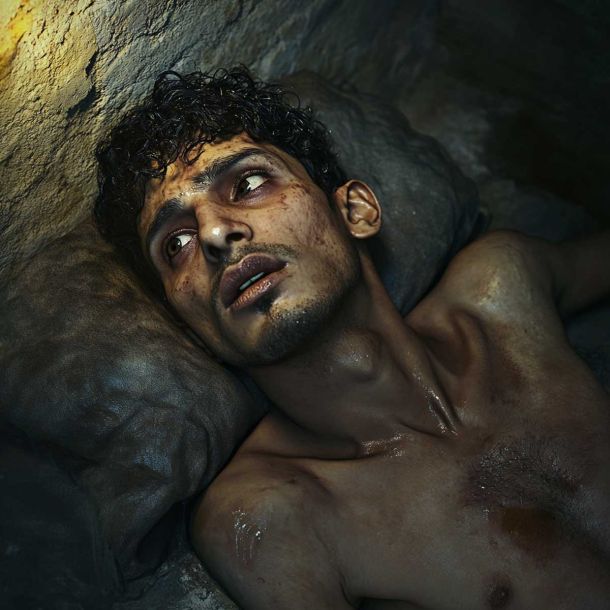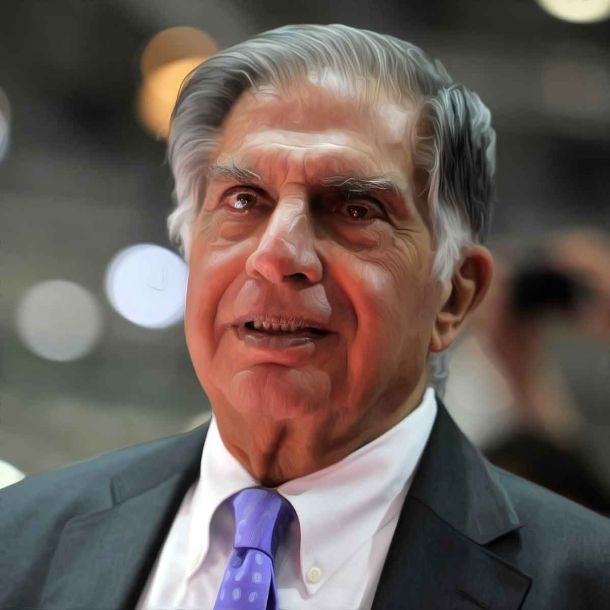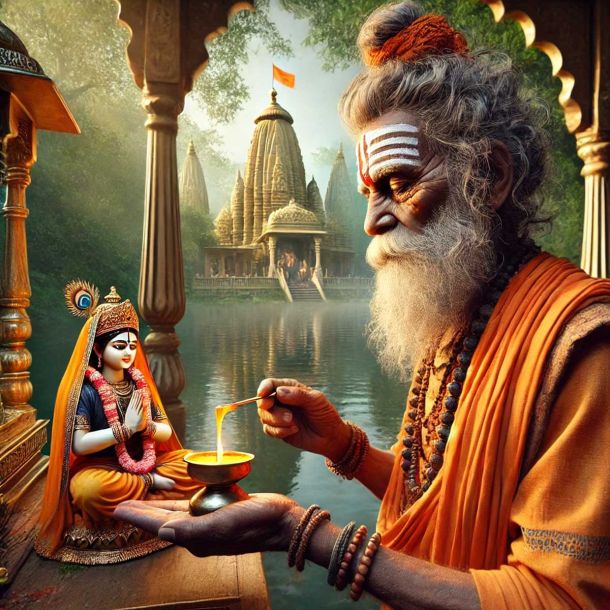MORE COVERAGE
Twitter Coverage
JOIN SATYAAGRAH SOCIAL MEDIA
“When the Fox hears the Rabbit scream he comes a-runnin', but not to help”: Irfan loved Shakuntala and wanted to keep her daughter Vijay Lakshmi with him but girl turns down proposal, Irfan with friends Sadan and Shehzad murdered Mother-daughter duo
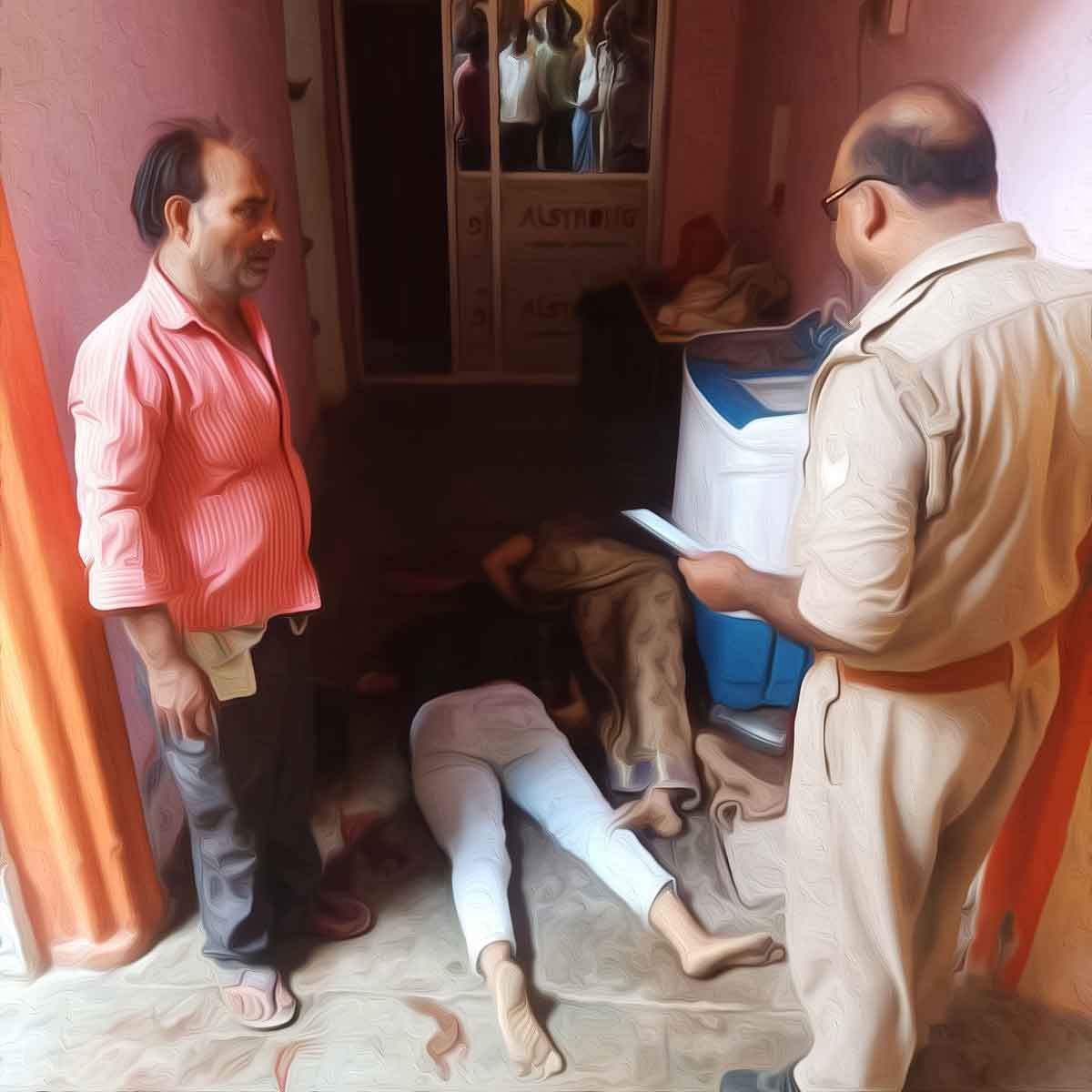
Earlier this month, Sultanpur police arrested Irfan and two others for murdering a mother-daughter duo. The murder reportedly took place on June 29. The other two accused have been identified as Sadan and Shehzad. The victims are Shakuntala and her daughter Vijay Lakshmi.
|
A three-year-old child came out of her house in tears. When neighbors asked her what the matter was, she could not reply and began to sob louder. Some locals went inside the house to inquire with the elders. To their utter shock, they found the bodies of the child’s aunt (bua) and grandmother lying on the floor in a pool of blood.
As word spread, police arrived on the spot, and so did Ramsukh Maurya, husband of the elder woman who was killed.
The incident took place on 28 June in Lambhua town of Sultanpur district in Uttar Pradesh. The diseased is Shakuntala, 50, and her daughter Vijay Lakshmi, 22.
|
The police have identified the killers as Mohammed Irfan alias Sonu and his accomplices Mohammed Shadan and Mohammed Shahbaz. As per police, Irfan has confessed that he killed the younger woman as she had turned down his advances, and killed her mother as she had witnessed the murder.
Irfan, who is 26 as per his Aadhaar card, also confessed that he was in a romantic relationship with his mother. Police say the murders were carried out brutally by slitting the throats.
A first information report (FIR) regarding the murders was filed at Lambhua police station on the same day (FIR number 223/2022), under IPC sections 302 (murder), 120B (criminal conspiracy), 201 (causing disappearance of evidence) and 452 (house-trespass).
Subsequently, the police have filed two more FIRs against the key accused, Irfan. The second FIR (number 225/2022) was filed on 3 July for attempting to murder a policeman. This was after the three men were arrested following an encounter with the police. The third FIR (number 226/2022) was filed on the same day against Irfan under The Arms Act, 1959.
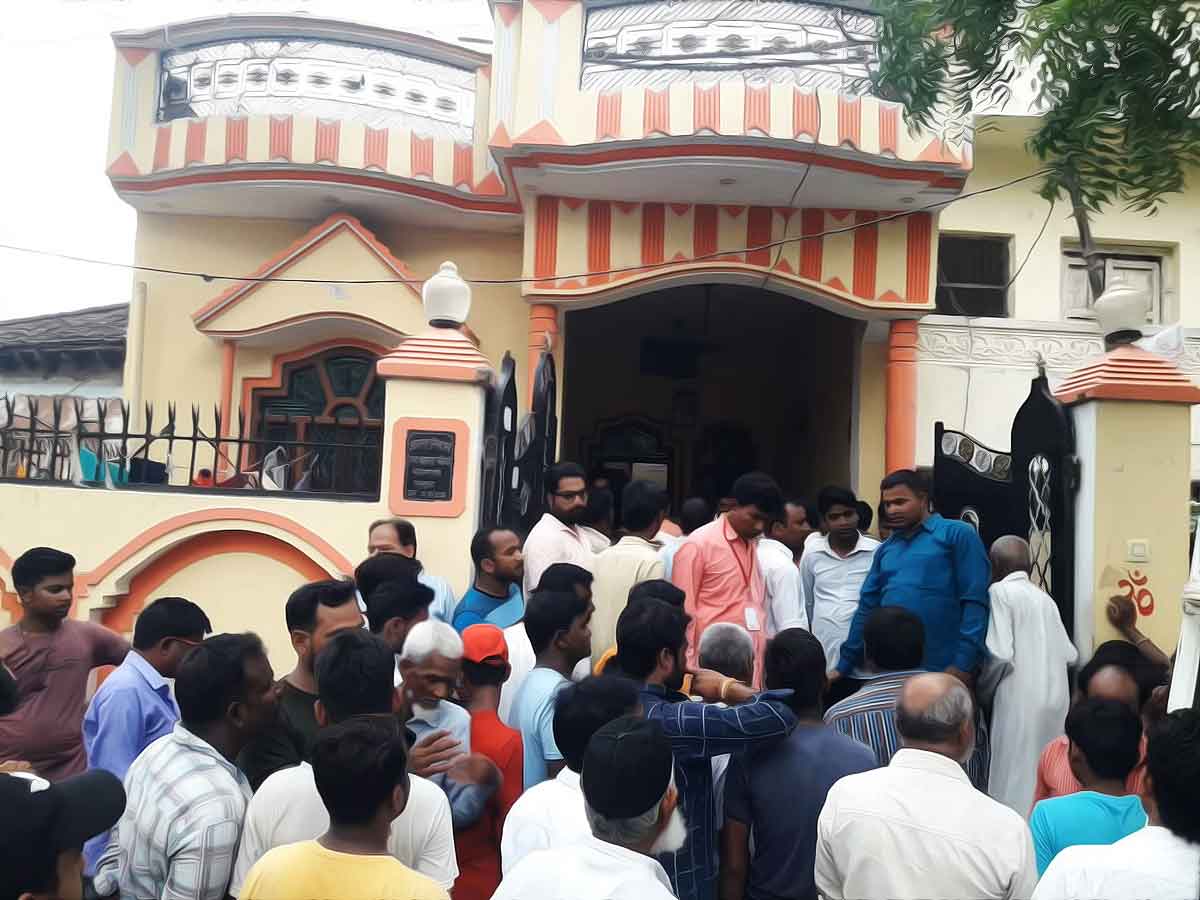 Locals outside the victims’ house on 28 June |
After the murder, when the media gathered at the spot and asked Ramsukh if he suspected anybody, he said he did not. Sultanpur Superintendent of Police Somen Verma, who had joined the post only a day earlier, told the media that the preliminary investigation did not show signs of a house break-in or robbery.
Irfan’s confession as recorded in the second FIR, which was filed on the statement of a policeman, says that he was in a relationship with Shakuntala and went to her house often.
The statement further says that Shakuntala’s husband Ramsukh, and their three children - Anand, Anil, and Vijay Lakshmi – were aware of this relationship. However, they had failed in preventing Shakuntala from pursuing the extra-marital affair. Vijay Lakshmi opposed the relationship most vehemently.
Irfan took a liking to the young Vijay Lakshmi. He developed the desire to form a relationship with her too. However, she turned him down strongly and repeatedly. “I wanted to have her at any cost but she was not succumbing to me at all,” Irfan’s confession says (translated from Hindi).
A spurned Irfan hatched a plan to murder Vijay Lakshmi. He involved his brother Shadaan alias Nadaan and a local resident, Shahbaz, in the conspiracy.
|
|
He bought a sharp knife and an iron road from the local market. At the opportune time around 4 pm on 28 June, when Ramsukh was at his vegetable shop and Anil at his beauty salon, the three men entered the house. The only person at home besides Vijay Lakshmi and Shakuntala was Anil’s three-year-old daughter.
Shahbaz stood guard at the door while the other two executed the murder of Vijay Lakshmi. When Shakuntala came rushing to the spot after hearing her cries, the two “cut her” to death. Before the three rushed out of the house, Irfan took away the mobile phones used by the women and later broke them and destroyed the SIM cards.
|
The men were arrested by the police on 2 July.
Irfan, son of Iftikhar Ahmed, hails from Hanswar town of Ambedkar Nagar district, which is around a two-hour road journey from Lambhua. Shadaan is his brother.
In Lambhua, Irfan was employed at Mishra tent house that is owned by Rajesh Mishra.
Shahbaz, son of Sameer Siddiqui, hails from Hathaura village of Lambhua Block in Sultanpur.
Local media later reported that the child survived the attack as she was sleeping, and woke up only after the two had left.
A communal pattern of such crimes
The heinous case is only an addition to a long list of similar cases where Muslim men have targeted Hindu women for relationships and killed them for turning them down. Similar cases of the reverse nature, that is Hindu men targeting Muslim women, rarely come to light, suggesting a highly skewed communal pattern of such gender crimes.
This pattern is visible prominently in neighboring Islamic countries namely Pakistan and Bangladesh, where reports of minority Hindu and Christian women targeted for sexual crimes and conversions are routine.
History in the Indian subcontinent
The major lacunae in the discourse over Love Jihad are its complete divorce from the reality and history of Hindu hatred.
Just like the cow, the body of a Hindu woman has long been the instrument of expressing the ‘might of Islam’ and subjugation of Hindus.
The Hindu men were derided as weak and effeminate, and Hindu women were taken away as the legitimate reward of conquest for the Muslim invaders.
Prof K S Lal notes in an essay, “..the largest number of slave girls was collected during raids, campaigns, and wars throughout the medieval period.. from the time of Muhammad bin Qasim, it was a consistent policy to kill all males, especially those capable of bearing arms, and enslave their hapless women.”
The captured women and children were forcibly converted to Islam. Those who resisted were tortured and killed.
Bernard Lewis notes that "polytheists and idolaters were seen primarily as sources of slaves, to be imported into the Islamic world and molded in Islamic ways, and, since they possessed no religion of their own worth the mention, as natural recruits for Islam."
In the European slave trade, in which black male slaves outnumbered their female counterparts by 2:1 or 3:1. However, in an Islamic empire, the ratio was reversed.
The Islamic law permitted unlimited numbers of slaves and the purchase of female slaves for sex by men. Latter was the most common motive for the purchase of slaves throughout Islamic history.
Lal quotes Ibn Battuta, a Moroccan Muslim traveler who visited Mohammad bin Tughlaq’s court, describing celebrations such as Id:
“First of all, daughters of Kafir (Hindu) Rajas captured during the course of the year, come and sing and dance. Thereafter they are bestowed upon Amirs and important foreigners. After this daughters of other Kafirs dance and sing... The Sultan gives them to his brothers, relatives, sons of Maliks, etc. On the second day, the durbar is held in a similar fashion after Asr. Female singers are brought out... the Sultan distributes them among the Mameluke Amirs”
Margoliouth observes, “Abu Bakr probably was aware that women are more amenable to conversion than men..” Women slaves turned concubines could increase the Muslim population by leaps and bounds when captured in large numbers. Hence there was a particular keenness on enslaving women from the very beginning of Islam, notes Lal.
It is important to note that targeting non-Muslim women wasn’t only a war-time phenomenon. Grounded in deeper ideological goals, it was promoted through art and literature as well.
Continuity
Perhaps the greatest evidence of Islamist ideological goals behind the targeting of non-Muslim women is visible in their continuity to present times. The notions that motivated past Hindu persecution, largely unchallenged by scholars and activists, continue to this day.
The manifestation of Hindu hatred targeting Hindu women is starkly visible in the Islamic Republic of Pakistan where Hindu minor girls are routinely abducted, converted to Islam, and married off to Muslim men. All this happens with clear support and encouragement of the Muslim clerics and the state apparatus, and without any international outrage.
The infamous Muslim grooming gangs in Britain also revealed the selective targeting of non-Muslim young girls. Last year, the Sikh Mediation and Rehabilitation Team Charity made public a report saying that the Muslim gang members have been systematically targeting Sikh girls of Indian background, for almost 50 years!
The report stated that the girls would be lured by “fashionably dressed Pakistani men pretending a modern outlook. They would roam around in flamboyant vehicles in areas and schools with the predominantly Sikh population”.
Long back in 2007, reports emerged that Islamic extremists had gained ground in different universities in the UK, and were targeting and forcibly converting Hindu women. They were reportedly paid £5,000 ‘commission’. Their aggressive conversion tactics included stalking, beating up those who protest and forcing women to drop out of college.
It is also noteworthy that most of the convicted 'grooming gang’ members were married and well-respected within their community. One gang member convicted of sex trafficking was a religious studies teacher at a mosque and a married father of five.
References:
swarajyamag.com
 Support Us
Support Us
Satyagraha was born from the heart of our land, with an undying aim to unveil the true essence of Bharat. It seeks to illuminate the hidden tales of our valiant freedom fighters and the rich chronicles that haven't yet sung their complete melody in the mainstream.
While platforms like NDTV and 'The Wire' effortlessly garner funds under the banner of safeguarding democracy, we at Satyagraha walk a different path. Our strength and resonance come from you. In this journey to weave a stronger Bharat, every little contribution amplifies our voice. Let's come together, contribute as you can, and champion the true spirit of our nation.
 |  |  |
| ICICI Bank of Satyaagrah | Razorpay Bank of Satyaagrah | PayPal Bank of Satyaagrah - For International Payments |
If all above doesn't work, then try the LINK below:
Please share the article on other platforms
DISCLAIMER: The author is solely responsible for the views expressed in this article. The author carries the responsibility for citing and/or licensing of images utilized within the text. The website also frequently uses non-commercial images for representational purposes only in line with the article. We are not responsible for the authenticity of such images. If some images have a copyright issue, we request the person/entity to contact us at This email address is being protected from spambots. You need JavaScript enabled to view it. and we will take the necessary actions to resolve the issue.
Related Articles
- "The people who abandon Jihad fall a victim to humility and degradation, Jihad is obligatory for the Muslims": While nation was still mourning over Ankita brutal killing by Shahrukh Hossain, in other #LoveJihad case Yameen Ahmed sl!t throat of Anjali Arya
- In yet another horrific incident of grooming jihad Mohammad Yasin, a supplier of ayurvedic medicine killed his second wife ‘Zara’ earlier a Hindu girl 'Shiva Vishwakarma': Left their three-year-old girl child outside the house
- Grooming Jihad: Kasim turns into Rahul sporting a kalava and the tilak to trap a minor Hindu girl of class 12, made her obscene video, later arrested for a kidnap attempt: Bareilly, Uttar Pradesh
- Mohammed Ansari brutally murders 18-year-old NEET aspirant 'girlfriend' Sonam Shukla and dumps the body in a creek in Malad hoping body would be eaten by fishes: Arrested and confessed to his crime
- While Hindus are at rest, one peaceful community is working overtime under the sentiments of Land Jihad to bring Indian Railways under Waqf Board
- Sensational revelation, Pakistan based Islamic organisation Dawat-e-Islami has huge support in Ahmedabad and gets money from over 2000 donation boxes to brainwash Muslim youth and inspire terror activities
- "Salaam-E-Ishq": In a shocking turn in Maharashtra, Shoaib Shaikh, a 24-year-old school dropout & garage worker, brutally murdered his girlfriend, Amrit Kaur, a 35-year-old bank manager and divorcee, in a Mumbai lodge on her birthday, driven by jealousy
- "What is “Love Jihad” that has arrived in Greece from Pakistan?": 17-year-old Nicoletta tragically killed by her adult Pakistani partner Sani, any weekend many Greek teenage girls can be seen with Pakistani boyfriends resulting Islamification of women
- Rajasthan Board of Muslim Waqf despite being land-rich itself turns to the State government for financial assistance in order to pay its workers’ salaries
- Our Sisters and Daughters has to face Hell just because we choose to ignore the reality ourselves - Of fear or favour, we need to understand the reason why Hindu women seldom speak out on the atrocities unleashed upon them in grooming jihad
